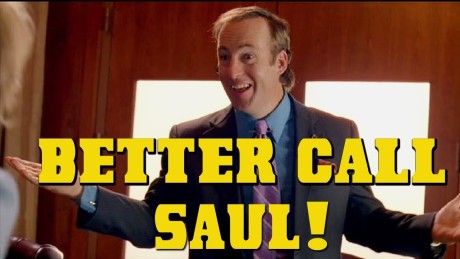 For Breaking Bad fans, this has to be good news: one of the show’s most memorable characters, lawyer Saul Goodman (played by Bob Odenkirk), is getting his own show, Better Call Saul. As one of those fans, I am excited.
For Breaking Bad fans, this has to be good news: one of the show’s most memorable characters, lawyer Saul Goodman (played by Bob Odenkirk), is getting his own show, Better Call Saul. As one of those fans, I am excited.
Written by Breaking Bad creator Vince Gilligan and Peter Gould, who had writing credits on eleven episodes, Better Call Saul premieres on AMC on February 8. Following up on such a beloved piece of popular culture is not without its risks, but given the superlative writing on Breaking Bad, it seems worth the risk.
An excellent article in the New York Times about the new show is a must-read; here is a summary of the plot:
[I]t is a prequel, set six years before Saul and Walter became known associates. Mr. Odenkirk is not playing exactly the same character. Instead, he is Jimmy McGill, a knock-around guy with a law degree who cannot catch a break or a decent case. The series is the story of how a guy who struggled to stay between the lines and above the belt became Saul, a criminal lawyer who is more criminal than lawyer. In the time frame of the new show, Walter is still teaching high school chemistry, perhaps to Jesse Pinkman, somewhere off screen, and Mr. Odenkirk’s character, rather than guiding the events around him as Saul did, is lost, blown about by forces beyond his control.
Then again, it is about as far from a lawyer show as you can get, long on character and less concerned with classic plot lines or courtroom procedure. Without giving away (too many) spoilers, the show opens in the future, after Walter’s downfall and Saul’s dispossession of his greasy empire. Saul is in his own version of witness protection, tucked away in the kind of job no one sees in a place where everyone goes. He is a hunted shell of the smack-talking lawyer, who finds solace in running old tapes of his once ubiquitous commercials beckoning one and all to call Saul. It is grim and scary, but the vibe is as much “X-Files” (which Mr. Gilligan used to write for) as it is “Breaking Bad.”
What made Breaking Bad so special was that it was practically Shakespearean in its depiction of the human condition; the pathos was palpable. Even as you knew the characters were despicable, you cared and felt for them. Real life is rarely black and white, and great writing captures that while maintaining a true moral north. Breaking Bad did that in spades. This new venture looks as if it will continue the excellence:
“Better Call Saul” is driven less by macabre plot points than a character-heavy look at the burdens of the human condition and the price of one man’s soul. It’s less frantic than “Breaking Bad,” relying on an anchored camera that zooms in for long hard looks. It is carefully constructed, with an emphasis on physical detail and sound that makes Jimmy’s law office in the back of a nail salon seem more like a jail cell than a place of business.
It is a writerly series put out by people who scan as writers, first and foremost. “Peter and Vince are a lot more like playwrights and novelists than screenwriters, and on set, Bob is always reading three books at the same time,” [Rhea] Seehorn said. “There are so many nuances to the work we are doing. We know where Saul ends up, but nothing here is played on the nose. There is always something underneath what is being said and done.”
I can’t wait.

